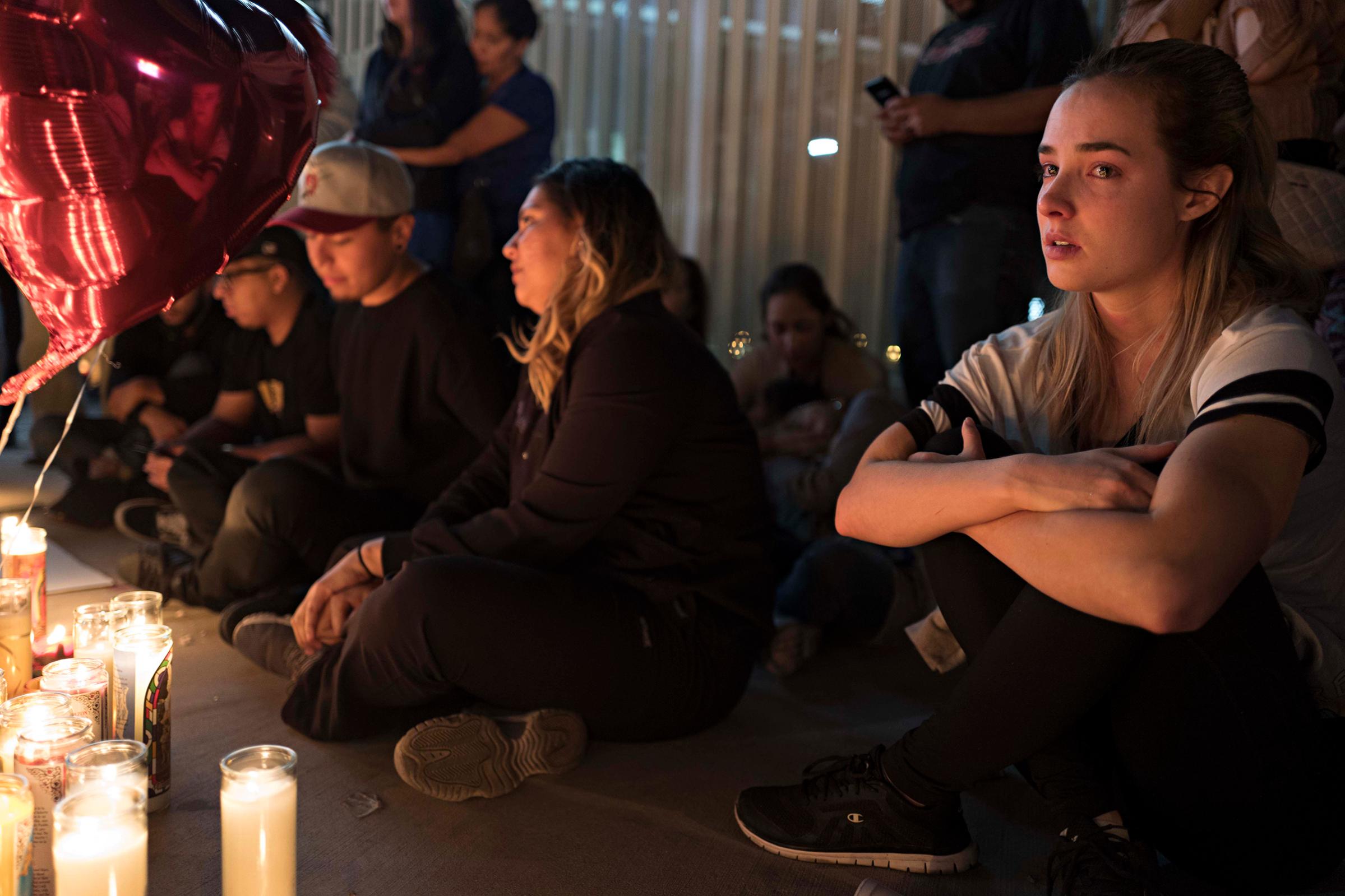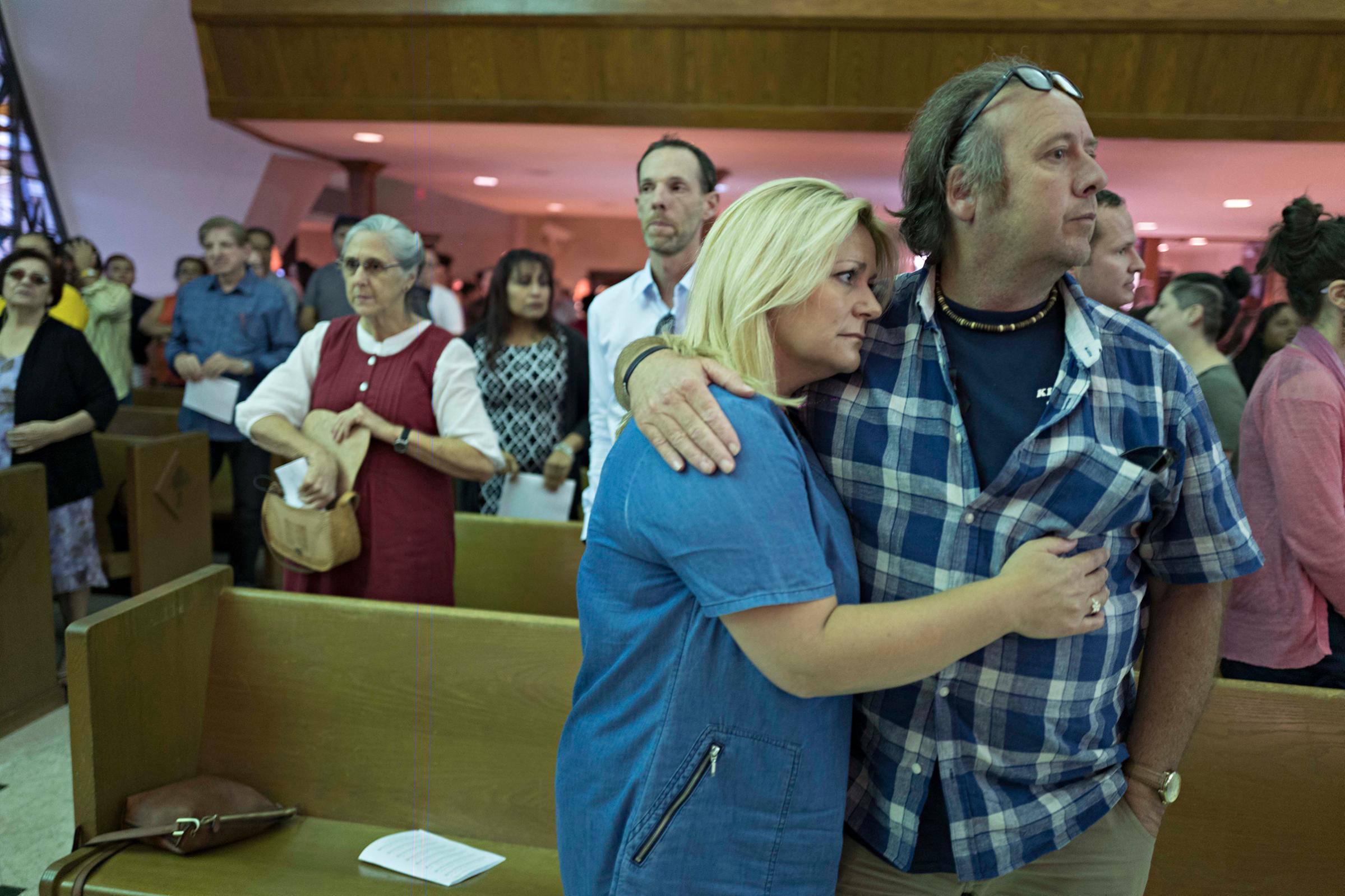The sound of an assault-style semi-automatic rifle unloading from 32 floors up and four football fields away doesn’t sound like you’d imagine. It’s louder, crisper. A shattering pop-pa-pop-pop of unique explosions that blend into each other to become a waterfall of noise. Like fireworks during a grand finale. Or the crackling of electrical feedback.
“We just thought there was a problem with the speaker,” said Renee Wilder, 36, who was outside a Hooters nearby when the shooting at the Route 91 Harvest country music festival began just after 10 p.m. on Sunday night. For the first few seconds after the shooting started—maybe 10 seconds, maybe longer; time didn’t seem real that night—the concert continued. Jason Aldean played on. No one knew what was happening.
But then the terror of it closed like a cold hand on their throat. “You don’t think it’s going to happen where you are,” said Sarah Barker, who had been inside the Bellagio when the shooting began. All gaming stopped, she said. Everyone was on lock down. No one was allowed to leave.
Outside, at the concert venue, which was surrounded by cyclone fences, people were lying on their stomachs on the pavement. The bullets felt like they were coming from everywhere. The terror might as well have lasted forever. Ten minutes, fifteen minutes: forever.
Everyone was screaming. A lot of people were lying on their stomachs too, but other people were getting up and running and then getting hit and falling, and trying to get up again. It felt like a scene from a war movie. There were fences penning everybody in. The only exit was toward where the bullets were coming from. People were on the ground and still getting hit, as if bullets were coming from the sky. Someone kept yelling, Get down, get down! There was no way out. No where to go.
The 911 emergency call center was swamped. Someone would answer, then put you on hold for minutes.
Melissa Bayer is not a prayer person. But when she and a friend, who were staying near the Mandalay Bay, heard the screaming and gunshots, she prayed so hard the words exploded in her head. Please God please God please God please.
At some point during the shooting, or maybe it was the moments after, when the deluge of bullets had ended, when the terrifying cacophony stopped, that Bayer realized what was happening. It came to her like an epiphany. She’d seen this before. She’d seen it in shaky cell phone footage on the news, in YouTube videos posted on Facebook. She’d seen the profiles of victims in the morning paper, survivors’ tearful remembrances the next day. She’d seen it in Columbine and Charleston and Sandy Hook and the movie theater in Colorado. This is a mass shooting, she thought. This is what it looks like.
The events in Las Vegas on the night of Sunday, Oct. 1, are distinct in the individual horrors they brought upon individual lives and the people who loved them. A special ed teacher. A school secretary. A clerk in a police department in Los Angeles. A registered nurse who took a bullet in his back, probably saving his wife’s life. A sister, 30, who laid on top of her 21-year-old brother to protect him, “because he has big goals in life,” a local reporter said. But it resonates in part because we recognize it for what it is: another mass shooting. It is not the first. It will not be the last.

They will continue to happen, just like this — different venues, different innocent lives — like clockwork, year after year after year. And we will be left as we always are: wringing our hands and shaking our heads and wondering what cancer exists in our society that makes it so we are the only wealthy nation on the planet that is regularly riven by anything even remotely comparable to mass shootings on a regular basis.
By midnight Sunday, there was blood on the pavement all over the festival ground and at Sunrise Hospital and Medical Center nearby, the emergency room was covered in blood. There was not a single tile that wasn’t red, U.S. Rep. Jacky Rosen told the local radio station. Not a single tile.
In the hospital itself, patients were backed up in the hallways. People were holding other people’s IV bags and putting on tourniquets themselves.
The University of Nevada Medical Center, the only local hospital with a Trauma 1 section, admitted 104 people. It had eight or nine operating rooms running simultaneously. By Monday night, four had died, and twelve more were in critical condition, said Danita Cohen, the facility’s public information officer, told local press.
A usually bustling convention center had been converted to a “Family Assistance Center” to help people locate friends and relatives, to find out if their loved ones had been killed.
Early Monday morning, Las Vegas Mayor Joe Lombardo and Clark County Commission Chair Steve Sisolak set up a GoFundMe account on Monday morning. Seventeen hours later, it had raised $2.9 million from 41,000 individual donations. By Tuesday afternoon, it had raised nearly $3.5 million from almost 50,000 donations.
Stephen Paddock, a 64-year-old retired accountant, checked into the hotel late last week and, over the weekend, transported ten suitcases full of explosives and at least 23 weapons to his room on the 32nd floor of the Mandalay Bay Casino. His car, parked by a valet, held bags of ammonium nitrate, which can be used to make a powerful explosive.

The police are reviewing hours of surveillance tape and have seized computers from Paddock’s properties in both Mesquite and Reno, authorities said Monday. Paddock’s girlfriend, who was in Tokyo on Sunday, was no longer a person of interest, but authorities wondered aloud what she might know. Investigators don’t yet know how it all happened, but the working theory is that Paddock didn’t check in with all 10 suitcases. He got the key to his room, then took the elevator up, bypassing the lobby, transporting each case, one or two at a time.
In Nevada, if you’re legally in possession of a gun, you can carry it with you wherever you’d like, in any public place, save a few exceptions, like schools and federal buildings. It’s legal to carry a gun on most private property as well, including casinos, although property owners are within their rights to ask you to leave.
On Sunday night, Paddock broke the window of his hotel room with a hammer-like tool and set up at least two weapons on tripods. The rate of fire indicated he was using at least one assault weapon or a semi-automatic that had been modified. He had hundreds of rounds of ammunition in his hotel room. He could have gone on for hours. Instead, it went on for about 15 minutes.
Guests in nearby rooms on the 32nd floor called to complain about the noise, and police and security was dispatched to the room within minutes. Paddock fired through the door at them and hit one of the security guards in the leg.
From there, what happened is unclear. There are about 45 minutes between when the shooting stopped and a SWAT team battered down Paddock’s hotel room door and found him dead.
But for those who were ducking bullets across the street, the hell had ended.
More Must-Reads from TIME
- Your Vote Is Safe
- The Best Inventions of 2024
- How the Electoral College Actually Works
- Robert Zemeckis Just Wants to Move You
- Column: Fear and Hoping in Ohio
- How to Break 8 Toxic Communication Habits
- Why Vinegar Is So Good for You
- Meet TIME's Newest Class of Next Generation Leaders
Write to Haley Sweetland Edwards / Las Vegas at haley.edwards@time.com